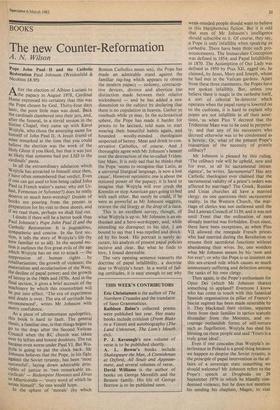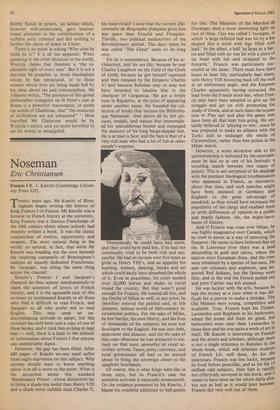BOOKS
The new Counter-Reformation
A. N. Wilson After the election of Albino Luciani to the papacy in August 1978, Cardinal Hume expressed his certainty that this was the Pope chosen by God. Thirty-four days later, the poor little man was dead. Back the cardinals clambered into their jets, and, after the funeral, in a torrid session in the Sistine Chapel, they came up with Karol Wojtyla, who chose the annoying name for himself of John Paul I. A Jesuit friend of Mine remarked at the time that you could believe the election was the work of the Holy Ghost if you liked, but that it was just as likely that someone had put LSD in the cardinals' pasta.
In all the extraordinary adulation which Wojtyla has attracted to himself since then, I have often remembered that verdict. Even if one can get used to him being called John Paul (a French waiter's name: why not Ur- ban, Formosus or Sylvester?) does he really deserve so much hero-worship? Dozens of books are pouring from the presses in preparation for his visit to these shores, and if we read them, perhaps we shall find out.
I doubt if there will be a better book than Paul Johnson's Pope John Paul II and the Catholic Restoration. It is pugnacious, sYmpathetic and concise. In the first sec- tion, it tells the story of Wojtyla's life (by now familiar to us all). In the second sec- tion it outlines the five great evils of the age which Wojtyla has set out to attack — the suppression of human rights by totalitarianism; the growth of violence; the materialism and secularisation of the West; the decline of papal power; and the growth of heresy in the 1960s and 1970s. And in the final section, it gives a brief account of the machinery by which this counterblast will be put into effect. 'The era of experiment and doubt is over. The era of certitude has recommenced', writes Mr Johnson with merry confidence.
As a piece of ultramontane apologetics, this book is hard to fault. The general thesis, a familiar one, is that things began to go to the dogs after the Second Vatican Council when the RC church was taken over by lefties and honest doubters. The rot became even worse under Paul VI. But Wo- jtyla is going to put the clock back. Mr Johnson believes that the Pope, in his fight against the Soviet tyranny, has been 'most successful', laying down admirable prin- ciples of justice in `two remarkable en- cyclicals' — Redemptor Hominis and Dives in Misericordia — 'every word of which he wrote himself. So one would hope.
In the sphere of 'morals' (by which Roman Catholics mean sex), the Pope has made an admirable stand against the familiar rag-bag which appears to obsess the modern papacy — sodomy, contracep- tive devices, divorce and abortion (no distinction made between their relative wickedness) — and he has added a new dimension to the subject by declaring that there is no copulation in heaven. Gather ye rosebuds while ye may. In the ecclesiastical sphere, the Pope has made it harder for priests to be laicised, told nuns to start wearing their beautiful habits again, and hounded woolly-minded theologians suspected of heresy. Meat and drink to con- servative Catholics, of course. And I thoroughly agree with Mr Johnson's lament over the destruction of the so-called Triden- tine Mass. It is only sad that he thinks that the Pope 'seems to recognise that Latin, as a universal liturgical language, is now a lost cause'. However optimistic one is about the restored power of the papacy, it is hard to imagine that Wojtyla will ever crush the Kremlin or stop American gays going to bed with each other. But surely he could, if he were as powerful as Mr Johnson suggests, restore the old liturgy at the drop of a tiara.
This is an excellent survey, though, of what Wojtyla is up to. Mr Johnson, is an en- thusiast and a hero-worshipper, and, while intending no disrespect to his idol, I am bound to say that I was repelled and shock- ed by his book. His portrait is surely ac- curate, his analysis of present papal policies incisive and clear. But what he finds to love, I found detestable.
The very opening sentence reasserts the doctrine of papal infallibility, a doctrine dear to Wojtyla's heart. In a world of fail- ing certitudes, it is easy enough to see why
weak-minded people should want to believe in this blasphemous fiction. But it is odd that men of Mr Johnson's intelligence should subscribe to it. Of course, they say, a Pope is only- infallible when speaking ex cathedra. There have been three such pro- nouncements. The Immaculate Conception was defined in 1854; and Papal Infallibility in 1870. The Assumption of Our Lady was defined in 1950 by Pius XII, egged on, he claimed, by Jesus, Mary and Joseph, whom he had met in the Vatican gardens. Apart from these three statements, the Popes have not spoken infallibly. But, unless you believe there is magic in the cathedra itself, a sort of celestial lie-detector which operates when the papal rump is lowered on to the cushions, it is hard to explain why popes are not infallible in all their asser- tions, as when Pius V decreed that the Tridentine Mass was to be used in perpetui- ty, and that any of his successors who decreed otherwise was to be condemned as a heretic. Or, what of the present Pope's reassertion of the necessity of priestly celibacy?
Mr Johnson is pleased by this ruling. 'The celibacy rule will be upheld, now and for ever, in all its sacramental intran- sigence', he writes. Sacramental? Has any Catholic theologian ever claitned that the sacramental validity of a priest's orders was affected by marriage? The Greek, Russian and Uniat churches all have a married clergy: no one questions their sacramental reality. In the Western Church, the mar- riage of clerics was not outlawed until the 2nd Lateran Council of 1139; and it was not until Trent that the ordination of men already married was forbidden. Even since, there have been exceptions, as when Pius VII allowed the renegade French priests who had married during the Revolution to resume their sacerdotal functions without abandoning their wives. So, one wonders what Mr Johnson means by his 'now and for ever'; or why the Pope is so insistent on this sex-crazed rule which causes so much unnecessary suffering and defection among the ranks of his own clergy.
Then again, is the Pope's enthusiasm for Opus Dei (which Mr Johnson shares) something to applaud? Everyone I know who has come in touch with this fanatical Spanish organisation (a pillar of Franco's fascist regime) has been made miserable by it. They blackmail their victims, separate them from their families in tactics scarcely dissimilar from the Moonies, and en- courage outlandish forms of self-torture such as flagellation. Wojtyla has shed his blessing on these people and said 'Yours is a truly great ideal'.
Even if one concedes that Wojtyla's in- terference in Poland is a good thing because we happen to despise the Soviet tyrants, is
the principle of papal intervention in the af- fairs of a sovereign state something we
should welcome? Mr Johnson refers to the Pope's speech at Drogheda on 29 September 1979 in which he blandly con- demned violence; but he does not mention his sending his chaplain, Magee, to visit Bobby Sands in prison, an action which, however well-intentioned, gave interna- tional attention to the exhibitionism of a ruthless petty criminal and did nothing to further the cause of peace in Ulster.
There is no point in asking 'Who does he think he is'? It is all too apparent. When speaking to the other dictators in the world, Wojtyla claims that freedom is 'the in- alienable right of every man'. But it is not a doctrine he preaches to those theologians whom he has persecuted, or to those women whose lives are being made hell by his ideas about sex and contraception. Mr Johnson writes, 'The presence of this genial philosopher evangelist on St Peter's seat in Rome is a powerful reassurance, to quote the words of Gladstone, that "the resources of civilisation are not exhausted" '. How horrified Mr Gladstone would be by Wojtyla's antics; and yet more horrified to see his words so misapplied.







































 Previous page
Previous page